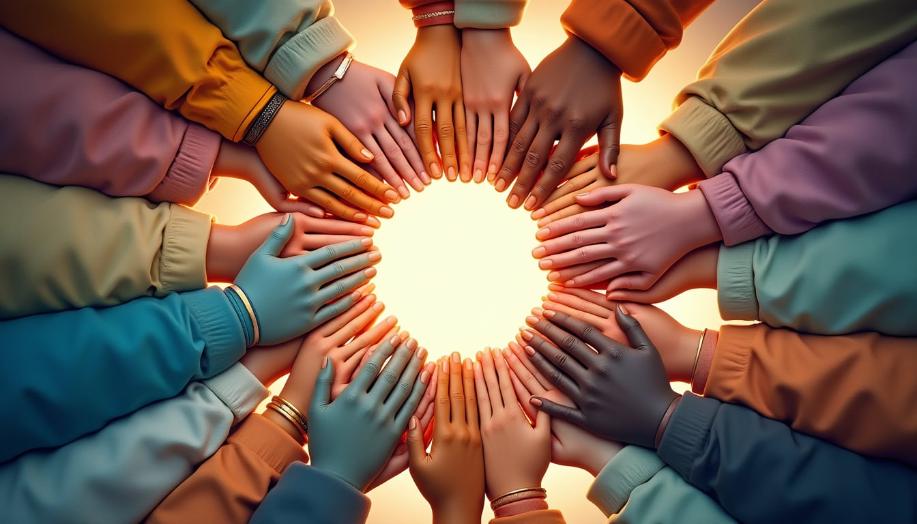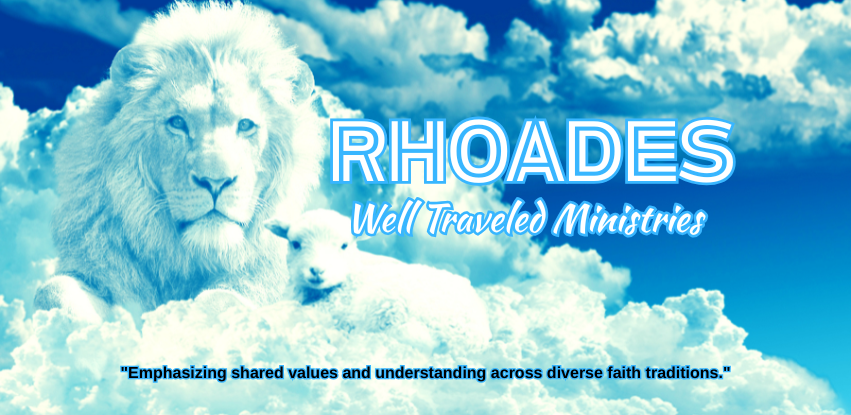Finding God in Every Garden:
My Journey Discovering Universal Love Across Faith Traditions
by Reverend Danny Rhoades
Sept. 1, 2025
Understanding My Journey Through Diverse Faith Traditions
Emphasizing Shared Values and Understanding Across Diverse Faith Traditions
Growing up in a multicultural neighborhood, I never expected that a simple conversation with my elderly neighbor would fundamentally reshape how I view faith and spirituality. Mrs. Chen, a devout Buddhist, and I discussed the concept of compassion over tea one rainy afternoon. What struck me wasn't our differences, but how remarkably similar her understanding of love and kindness was to my own Christian upbringing.

hat moment sparked a decades-long journey. I've since found myself sitting in synagogues, mosques, temples, and churches. I've broken bread with Sikhs, meditated with Hindus, and shared stories with Indigenous elders. Each encounter challenged my assumptions and expanded my heart.
Today, I want to share what I've discovered along this winding path. The divisions we often focus on—the rituals, the languages, the traditions—are just the surface. Beneath lies something profound and universal. Something that connects us all, regardless of which sacred text we read or which prayers we whisper in the dark.
This isn't about diminishing the beauty of our distinct traditions. It's about recognizing the golden threads that weave through them all.
Understanding My Journey Through Diverse Faith Traditions
My exploration began accidentally. Fresh out of college, I landed a job at an interfaith nonprofit organization. The position required me to attend various religious services and community events. I'll be honest—I was terrified.
Walking into my first mosque, I felt completely out of place. The call to prayer echoed around me in Arabic, a language I didn't understand. Yet something beautiful happened during that service. I witnessed devotion that transcended language barriers. The collective bowing, the peaceful silence, the sense of community—it reminded me of my own church experience, just expressed differently.
My second major encounter came at a Hindu temple during Diwali. The vibrant colors, the intricate ceremonies, the offerings of flowers and food—everything seemed foreign to my Protestant sensibilities. But then an elderly woman approached me. She explained that they were celebrating the triumph of light over darkness, good over evil. Her eyes sparkled as she spoke about hope and renewal.
Light over darkness. Good over evil. Hope and renewal.
These weren't foreign concepts at all. They were the very foundations of my own faith, just wrapped in different cultural clothing.
Each tradition I encountered became a mirror, reflecting familiar values through new prisms. The Jewish concept of tikkun olam—repairing the world—resonated deeply with my understanding of Christian service. The Sikh principle of selfless service, or seva, echoed the same call to help others that I'd heard countless times from church pulpits.
Indigenous ceremonies taught me about reverence for creation in ways that connected to my childhood Sunday school lessons about stewardship. Islamic teachings on charity and social justice aligned perfectly with the Christian emphasis on caring for the poor and marginalized.
Month after month, service after service, my notebook filled with observations. Not about differences, but about striking similarities. The more I learned, the more I realized that my journey wasn't taking me away from my roots—it was helping me understand them more deeply.
Recognizing Common Values in Different Beliefs
The Golden Rule Lives Everywhere
After years of exploration, one truth became undeniable: every tradition I encountered held some version of the Golden Rule. Christians know it as "Do unto others as you would have them do unto you." But I discovered Muslims practice it through the hadith: "None of you believes until he wishes for his brother what he wishes for himself." Jews embrace it in the Talmud: "What is hateful to you, do not do to your neighbor." Hindus express it beautifully: "This is the sum of dharma: do not do to others what would cause pain if done to you."
The words varied. The languages differed. The cultural contexts changed. Yet the core message remained constant—treat others with the kindness and respect you desire. This wasn't coincidence. It was evidence of something deeper, something woven into the fabric of human spirituality itself.
Service as Sacred Expression
I'll never forget volunteering at a homeless shelter run by a Sikh gurdwara. The devotion with which volunteers served meals reminded me of church soup kitchens. No questions asked. No judgment passed. Just pure service. The Sikhs called it seva—selfless service as worship. My Christian friends called it ministry. Jewish communities spoke of mitzvot—good deeds as divine commandments.
Different names. Same heart. Every tradition emphasized that true spirituality extends beyond personal prayer into action. Whether it's Islamic zakat, Hindu dharma, or Buddhist compassion in action, the message rang clear: faith without service is incomplete. We're called to be our brother's keeper, regardless of which sacred text taught us that responsibility.
Love as the Ultimate Truth
Perhaps the most powerful realization came during a conversation with a Sufi mystic in Istanbul. He spoke about divine love with such passion that tears filled his eyes. His words about surrendering to love, about losing oneself in compassionate service, could have come from any Christian mystic. Love wasn't just a value—it was the central organizing principle.
I found this same emphasis everywhere I looked. Hindu devotion speaks of boundless love for the divine. Jewish teachings emphasize love of God and neighbor. Buddhist loving-kindness meditation cultivates universal compassion. Indigenous traditions honor love for all creation. The expression varied, but the destination remained the same: love as the highest spiritual achievement.
Hope in the Face of Darkness
Every tradition I studied had wrestled with suffering. Every one offered hope. Christians speak of resurrection after crucifixion. Jews celebrate Passover—liberation from bondage. Muslims observe Ramadan, emerging purified and renewed. Hindus believe in rebirth and eventual liberation. Buddhists seek enlightenment beyond suffering.
The specific narratives differed dramatically. But the underlying promise never wavered: darkness is temporary, suffering can be transformed, and hope endures. This wasn't naive optimism. It was hard-won wisdom, tested through centuries of human experience. Each tradition offered its followers—and anyone willing to listen—the profound assurance that light ultimately conquers darkness.
The Importance of Empathy and Open Dialogue
My transformative encounters across faith traditions taught me something crucial: understanding begins with our willingness to truly listen. I remember sitting in a Quaker meeting for the first time, surrounded by complete silence. For twenty minutes, no one spoke. My Protestant upbringing had conditioned me to expect hymns, sermons, and structured worship. The silence felt uncomfortable, almost empty. But then something shifted. In that quiet space, I began to hear—not with my ears, but with my heart. I realized that my initial discomfort stemmed from my own expectations, not from any deficiency in their practice. That meeting taught me that empathy requires us to step outside our comfort zones and suspend our judgments.
True interfaith dialogue cannot happen when we approach other traditions with closed hearts or predetermined conclusions. I've witnessed countless conversations fall apart because someone insisted their way was the "right" way. These interactions taught me several essential principles for meaningful dialogue:
• Listen more than you speak - Ask questions out of genuine curiosity, not to prove a point
• Suspend judgment temporarily - Allow yourself to experience another tradition without immediately comparing it to your own
• Focus on shared human experiences - Pain, joy, love, and loss are universal languages
• Acknowledge your own biases - We all carry cultural and religious assumptions that color our perceptions
• Celebrate differences as gifts - Diversity in spiritual expression enriches our collective understanding
• Find common ground in values - Compassion, justice, and love appear across all major faith traditions
The most profound conversations I've had occurred when both parties approached each other with what I call "sacred curiosity." This means treating someone else's faith experience as holy ground—worthy of respect and careful attention. When my Muslim friend Amira explained her experience of Ramadan, she didn't just describe the mechanics of fasting. She shared how those moments of hunger connected her to the suffering of others and deepened her gratitude. Her vulnerability opened my heart. In return, I shared how communion serves a similar function in my Christian practice—creating connection and fostering gratitude. We weren't trying to convert each other. We were simply human beings sharing the sacred parts of our lives. That exchange created a bridge between our worlds.
Personal Experiences That Shaped My Perspective
Three pivotal moments stand out in my interfaith journey, each one carving deeper grooves of understanding into my heart. The first happened during Ramadan when my Muslim colleague, Fatima, invited me to join her family for iftar—the evening meal that breaks the daily fast. I expected an elaborate religious ceremony. Instead, I found myself around a humble dining table, sharing simple dates and water as the sun set. The gratitude in that room was palpable. Fatima's teenage son spoke quietly about how fasting taught him empathy for those who go without food every day. Her grandmother, speaking broken English, told me that Ramadan wasn't about deprivation—it was about connection. Connection to God, to community, to those less fortunate. I thought about my own Lenten practices, my church's food drives, and realized we were talking about the same spiritual discipline, just expressed at different times of the year.
The second transformative experience came unexpectedly during a Shabbat dinner at my Jewish neighbor's home. David had mentioned it casually over the fence, and I accepted more out of curiosity than genuine interest. As his wife, Sarah, lit the candles and spoke blessings over bread and wine, I was transported back to countless communion services. The words were different, the timing was different, but the sacred act of sharing a meal while acknowledging the divine felt remarkably familiar. Their teenage daughter asked thought-provoking questions about the week's Torah portion, challenging interpretations and diving deep into ethical implications. It reminded me of my own youth group discussions, where we wrestled with difficult biblical passages late into the evening. The commitment to questioning, learning, and growing in faith transcended our different traditions.
My third eye-opening moment arrived during a meditation retreat at a Buddhist monastery. I'd signed up on a whim, thinking it would be an exotic spiritual adventure. The reality was far more challenging—and rewarding—than I anticipated. Sitting in silence for hours forced me to confront my own restless mind and spiritual impatience. The monk leading our sessions, Brother Thomas (a former Catholic priest who'd found his path in Buddhism), spoke about mindfulness and compassion with a depth that touched something profound within me. During one evening talk, he said something that stopped me cold: "We're all trying to wake up from the dream of separation." Those words echoed for weeks. They helped me understand that my journey through different faith traditions wasn't about collecting spiritual experiences—it was about recognizing the universal human longing for connection, meaning, and transcendence.
These encounters taught me five crucial lessons that continue to shape how I approach interfaith dialogue:
Sacred practices often serve similar purposes across traditions - whether it's fasting, meditation, prayer, or communal meals
Questions matter more than answers - every tradition encourages deep thinking about life's biggest mysteries
Community and family remain central - faith is rarely a solitary journey, regardless of the specific beliefs involved
Service to others appears as a core value - helping those in need transcends denominational boundaries
The search for meaning and connection to the divine drives human spirituality - regardless of the names we use or rituals we practice
These insights didn't diminish my own Christian faith. Instead, they illuminated aspects of it I'd never fully appreciated before. Seeing my beliefs reflected and refracted through other traditions helped me understand their depth and beauty in entirely new ways.
Building Bridges: Creating Community Through Shared Values
The real magic happens when we move beyond understanding to action.
Three years ago, I helped organize our city's first interfaith service project. What started as a small conversation between five religious leaders turned into something extraordinary. We decided to focus on addressing homelessness—an issue that every faith tradition called us to tackle.
I watched something beautiful unfold. Rabbi Sarah rolled up her sleeves alongside Imam Abdullah, preparing bags of sandwiches. Sister Maria chatted with Pandit Sharma about their shared experience working with refugees. The Buddhist meditation group brought mindfulness practices to help volunteers stay centered during emotionally challenging work.
Nobody preached. Nobody converted. We just served.
The homeless individuals we helped didn't care about our different prayer books or worship styles. They cared that we showed up. They experienced the love that flows through every authentic spiritual tradition, expressed through practical action.
That project became an annual event. Then monthly efforts. Now our interfaith coalition runs year-round programs addressing food insecurity, educational gaps, and environmental concerns. We've created something powerful—a community united not by identical beliefs, but by shared commitment to making our world better.
The key lies in focusing on common ground first. When planning interfaith initiatives, I've learned to start conversations around values rather than doctrines. Questions like "How does your faith call you to serve others?" open hearts. Questions like "What does your religion teach about salvation?" often close them.
I've discovered that storytelling builds bridges faster than theological debates. When Ahmed shares how Ramadan fasting taught him empathy for the hungry, everyone connects. When Lisa describes finding peace through Buddhist meditation during her mother's illness, we all nod with recognition. Stories reveal our shared humanity in ways that position papers never could.
Creating inclusive spaces requires intentionality. Our interfaith meetings rotate between different religious venues. We schedule around everyone's holy days. We provide vegetarian meals to accommodate various dietary requirements. Small gestures communicate big messages about respect and belonging.
The children inspire me most. At our community events, I watch kids from different faith backgrounds playing together naturally. They don't see barriers—they see friends. A young Muslim girl teaching a Jewish boy Arabic phrases. Christian and Hindu teenagers working together on art projects. They're building relationships that will shape our community's future.
These bridges we're building aren't just about feel-good moments. They're creating practical benefits. When our mosque faced vandalism two years ago, the response was immediate and overwhelming. Christians, Jews, Buddhists, and others showed up with cleaning supplies, security volunteers, and messages of support. That's what community looks like.
Building bridges requires patience. Some people remain suspicious of interfaith efforts, worried about compromising their beliefs. I understand those concerns—I once shared them. Change happens slowly, one conversation at a time, one shared experience at a time.
The work also demands humility. I've made mistakes, used insensitive language, misunderstood customs. Each error became a learning opportunity. Authentic bridge-building requires admitting when we don't know something and being willing to grow.
But the rewards are immeasurable. I've gained not just knowledge, but family. The pastor who married my daughter. The rabbi who comforted me through my father's death. The imam who helped my son understand bullying from a place of strength, not victimhood. These relationships enriched my life in ways I never anticipated.
We're proving that diversity strengthens rather than weakens communities. Our different perspectives help us tackle problems more creatively. Our various resources multiply our impact. Our combined voices carry more weight with local officials and organizations.
Conclusion
Sitting here today, reflecting on the winding path that began with tea and conversation with Mrs. Chen, I'm overwhelmed by gratitude. That elderly Buddhist woman, sharing her understanding of compassion on a rainy afternoon, opened a door I didn't even know existed.
This journey through diverse faith traditions hasn't weakened my own beliefs. Instead, it's deepened them. I understand my Christian faith more profoundly now, having seen its core values reflected in synagogues and mosques, temples and meditation halls. The golden threads I discovered—compassion, service, justice, love, hope—aren't unique to any single tradition. They're woven through the fabric of human spirituality itself.
My notebook, once filled with nervous observations about unfamiliar rituals, now overflows with stories of friendship and collaboration. The differences that once seemed so vast—the languages, ceremonies, and customs—have become sources of beauty rather than barriers. They're different expressions of the same deep human longing for meaning, connection, and purpose.
The interfaith community we've built in our city stands as proof that understanding across faith traditions isn't just possible—it's transformative. When we focus on shared values rather than theological differences, when we lead with curiosity instead of judgment, when we prioritize service over doctrine, something miraculous happens. We discover that we're not as different as we thought.
This doesn't mean ignoring the real distinctions between faith traditions. Each religion brings unique wisdom, practices, and perspectives that deserve respect and preservation. But it does mean recognizing that these differences don't have to divide us. They can enrich us instead.
The children playing together at our community events understand this instinctively. They see friends where adults often see obstacles. They build relationships where we construct barriers. They're teaching us that the future belongs to those willing to embrace both diversity and unity.
Mrs. Chen passed away last spring. At her memorial service, held at the Buddhist temple, I sat surrounded by neighbors from every faith tradition in our community. We were all there for the same reason—to honor a woman who embodied compassion, regardless of the religious language we used to describe it.
That's the legacy I want to continue building. A community where understanding transcends tradition, where shared values create unbreakable bonds, and where the golden threads that connect us all shine brighter than the surface differences that once kept us apart.
The journey continues. And I can't wait to see where it leads us next.

